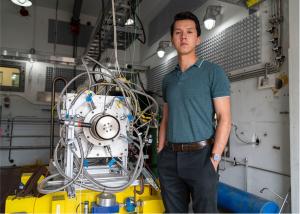Injecting Agility in Defense Innovation: NPS Researcher Applies Lessons Learned from DARPA Fellowship
Following a three-month embed with DARPA, Naval Postgraduate School faculty member, Alexis Theony, shares innovation lessons learned and how to apply them.
MONTEREY, CA, UNITED STATES, August 1, 2025 /EINPresswire.com/ -- After completing a three-month fellowship with the Defense Advanced Research Projects Agency (DARPA), Alexis Thoeny, a Naval Postgraduate School (NPS) faculty associate for research in the NPS Department of Mechanical and Aerospace Engineering, returned to campus with fresh ideas and a sharper focus on accelerating innovation across NPS, the U.S. Navy and the Department of Defense.
Thoeny participated in the Service Chiefs Fellowship Program (SCFP), a highly selective initiative that embeds military officers and civilians within DARPA teams to support early-stage technology development. According to the DARPA website, the 12-week program “allows outstanding service members to immerse themselves in our world of innovative science and technology research. Participants gain an understanding of DARPA’s mission and our unique approach to ensuring the U.S. maintains the advantage of technological surprise.”
NPS Public Affairs spoke with Thoeny about his experience, what he learned, and how NPS can build stronger ties with DARPA for greater impact.
Q: What is the Service Chiefs Fellowship Program, and how did you become involved?
A: The Service Chiefs Fellowship Program is a three-month rotation at DARPA where military officers and a few civilians are embedded in various technical offices. The goal is to bring operational and technical perspectives into the early stages of research. I applied because I wanted to understand how DARPA approaches challenges and how they move ideas quickly from concept to execution.
Q: What was the environment at DARPA like?
A: Fast. Everyone runs as fast as they can at DARPA. From program managers to contractors to IT support, everything is focused and moves with urgency. There is a strong sense of purpose across the organization.
Q: What was your role during the fellowship?
A: I joined technical exchange meetings, provided design feedback, and helped shape early-stage ideas. Most of the cohort came from acquisition backgrounds, so I brought a different viewpoint as a civilian researcher. That mix of experience helped create a more well-rounded approach to the projects we supported.
Q: How do you plan to apply those lessons at NPS?
A: One major takeaway is that NPS can help DARPA gain access to operational insight more quickly. I have been working on a concept that would act like a faster version of the Naval Research Program, designed to match DARPA's tempo. It would fund short-turnaround research projects led by students or faculty with military experience.
Q: Is that concept already moving forward?
A: It is still in the idea stage, but I have had conversations with DARPA’s Navy liaison and with faculty in the Mechanical and Aerospace Engineering department here at NPS. The interest is there. Now it comes down to connecting the right people and acting quickly enough to be useful.
Q: How could this benefit NPS students and faculty?
A: It gives them hands-on experience with emerging technologies. If DARPA sponsors projects inside NPS programs like the new master’s in innovation, students can work on real-world challenges while still in school. When they return to the fleet, they bring practical knowledge and firsthand experience, which can make a big impact.
Q: Has anyone else from NPS done this fellowship?
A: Only one other faculty member from NPS has participated in the program, as far as I know. I hope more people pursue it. The opportunity is there, and it is worth it.
Q: Would you recommend it to others?
A: Definitely. If your command supports it, go for it. The experience is intense. You are learning nonstop, and you leave with a completely new way of thinking. It is challenging, but the insight and connections you gain are invaluable.
Hear more from Alexis Theony in this DARPA video.
LCDR Kristina Wiedemann, USN
Naval Postgraduate School, Public Affairs
+1 831-656-3567
pao@nps.edu
Visit us on social media:
LinkedIn
Instagram
Facebook
YouTube
X
Legal Disclaimer:
EIN Presswire provides this news content "as is" without warranty of any kind. We do not accept any responsibility or liability for the accuracy, content, images, videos, licenses, completeness, legality, or reliability of the information contained in this article. If you have any complaints or copyright issues related to this article, kindly contact the author above.

